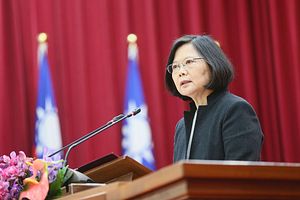On February 28, Beijing’s Taiwan Affair Office (TAO) issued a series of measures to “promote cross-strait economic and cultural exchanges and cooperation.” The TAO said that Beijing decided to “take the lead” to share opportunities on the mainland with Taiwanese people and gradually grant them equal treatment with local mainlanders when it comes to education, entrepreneurship, employment, and residence.
These 31 detailed measures, the TAO said, were made based on consultations with a total of 30 ministries, departments, and government and party organs. Twelve of the measures deal with equal treatment for Taiwanese enterprises and 19 are aimed at Taiwanese individuals.
For example, Beijing will allow qualified Taiwanese companies to cooperate with mainland counterparts to provide small payment and credit services for Taiwanese people, participate in government procurement and other infrastructure construction projects, receive subsidies, and take tax deductions. In the entertainment field, restrictions on Taiwanese actors and actresses and on importing Taiwanese films and television dramas to the mainland will be either lifted or relaxed.
Taiwanese people will be allowed to participate in a number of professional or vocational qualification examinations and work in the mainland.
As The Diplomat reported earlier, even Hong Kong and Macao citizens, under the “one country, two systems” principle, do not yet enjoy equal treatment with local mainlanders in some of these areas.
The TAO’s latest announcement is in line with what Chinese President Xi Jinping promised during the 19th National Congress of the Chinese Communist Party (CCP) last year.
On October 18, 2017, Xi delivered a three-and-a-half-hour work report, in which he vowed to “share the development opportunities on the mainland with our Taiwan compatriots first” and “expand cross-straits economic and cultural exchanges and cooperation for mutual benefits.” Xi added, “Blood is thicker than water. People on both sides of the Taiwan Straits are brothers and sisters; we share the bond of kinship.”
Now that Xi has more or less delivered on his promises to “Taiwan compatriots,” the question is whether Beijing will keep adding pressure on the Tsai Ing-wen administration in Taiwan. Xi used unusually strong words to stress the importance of the “1992 Consensus” in his work report, too.
Xi said:
The 1992 Consensus embodies the one-China principle and defines the fundamental nature of cross-straits relations; it thus holds the key to the peaceful development of relations between the two sides of the Taiwan Straits…
We stand firm in safeguarding China’s sovereignty and territorial integrity, and will never allow the historical tragedy of national division to repeat itself. Any separatist activity is certain to meet with the resolute opposition of the Chinese people… We will never allow anyone, any organization, or any political party, at any time or in any form, to separate any part of Chinese territory from China!
Since Tsai came into office, the cross-strait relationship has deteriorated. In order to push Tsai to recognize the “1992 Consensus,” Beijing has constantly increased its diplomatic pressure on Taipei.
Recently, Taipei and Beijing broke out in a row over new air routes in the Taiwan Strait, which were announced by the mainland without consultation with Taiwan. In response, Taiwan’s government refused to approve additional flights by mainland airlines during the Spring Festival holiday. Hundreds of airlines across the strait were canceled, impacting thousands of people, yet neither side has backed off.
It remains to be seen whether Beijing’s latest policy — undoubtedly the biggest carrot offered to Taiwan people so far — will be successful in driving a wedge between Tsai’s government and public opinion on Taiwan.

































